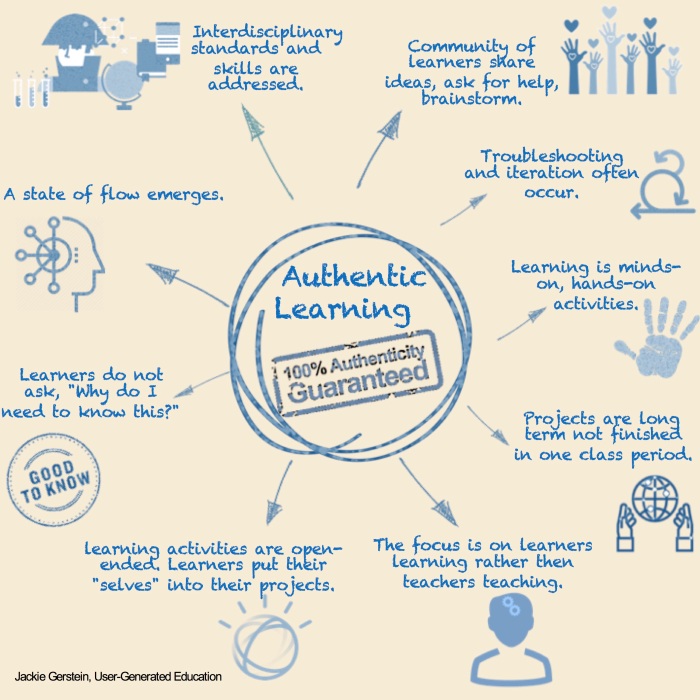Principles of Authentic Learning Experiences
Providing authentic learning experiences to all learners should be the highest prior for all administrators, curriculum developers, and teachers.
Authentic learning is learning designed to connect what students are taught in school to real-world issues, problems, and applications; learning experiences should mirror the complexities and ambiguities of real life. Students work towards production of discourse, products, and performances that have value or meaning beyond success in school; this is learning by doing approach (Authentic learning: what, why and how?).
In education, the term authentic learning refers to a wide variety of educational and instructional techniques focused on connecting what students are taught in school to real-world issues, problems, and applications. The basic idea is that students are more likely to be interested in what they are learning, more motivated to learn new concepts and skills, and better prepared to succeed in college, careers, and adulthood if what they are learning mirrors real-life contexts, equips them with practical and useful skills, and addresses topics that are relevant and applicable to their lives outside of school. For related discussions, see 21st century skills, relevance, and rigor (Authentic Learning).
The bottom line, in my perspective, is that learners view their experiences as having relevancy to their own lives, that they address their interests and needs.
Qualities of Authentic Learning
I believe authentic learning experiences have the following qualities (which, by the way, are way too, often are not the qualities of many classroom activities):
- A state of flow – learners often say, “Is it time to go already?” For more about this, see Flow – A Measure of Student Engagement https://usergeneratededucation.wordpress.com/2011/01/12/flow-a-measure-of-student-engagement/.
- Interdisciplinary standards and skills are addressed. For more about this, see All Lessons Should Be Interdisciplinary https://usergeneratededucation.wordpress.com/2019/01/13/all-lessons-should-be-interdisciplinary/
- The focus is on learners learning rather than teachers teaching. For more about this, see ‘The Objective of Education Is Learning, Not Teaching’ http://knowledge.wharton.upenn.edu/article/the-objective-of-education-is-learning-not-teaching/.
- Often are minds-on, hands-on activities. For more about this, see The Imperative of Experiential and Hands-On Learning https://usergeneratededucation.wordpress.com/2016/12/23/the-imperative-of-experiential-and-hands-on-learning/.
- Learners do not ask, “Why do I need to know this?” Because authentic learning involves student voice and choice. they develop their own constructivist reasons for their need to know. For more about this, see Why Do I Need to Know This? https://usergeneratededucation.wordpress.com/2014/03/16/why-do-i-need-to-know-this/ .
- The learning activities are open-ended so learners put their “selves” into their projects. For more about this, see Open Ended Learning: What, Why, and How https://thehomeschoolscientist.com/open-ended-learning-resource/.
- Projects are long term not finished in one class period. They take many hours, many class periods.
- Troubleshooting and iteration often occur. Learning as an iterative process is discussed in Educators as Lead Learners https://usergeneratededucation.wordpress.com/2015/02/15/educators-as-lead-learners/.
- The learners become a community of learners sharing ideas, asking for help, brainstorming. For more about this, see The Importance of Building Community in the Classroom https://www.teachervision.com/blog/morning-announcements/importance-building-community-classroom

Some Recent Examples of Authentic Learning
Here are some recent examples I have done with my learners – one class did a social entrepreneurship unit while another class made Makey Makey Marble Mazes. I posted videos so their engagement can be seen.
Social Entrepreneurship
My students are finishing a unit on social entrepreneurship where they started a business to raise monies for a local nonprofit. They created a market survey using a Google Form, which asked about products, price points, potential nonprofit organization recipients of the profits; analyzed survey results, decided on and tested products; developed an expense sheet, using Google Sheets, for expenses and income; created a business plan that included the name of company, cost analysis, promotional plan; made a promotional flyer; created a sales and record sheet; delivered products; and managed monies.
For more information about this unit, see Elementary Social Entrepreneurship: A Perfect STEAM Lesson https://usergeneratededucation.wordpress.com/2018/05/13/elementary-social-entrepreneurship-a-perfect-steam-lesson/.
Makey-Makey Marble Mazes
Another group of earners made a Makey-Makey Marble Mazes as described by @Colleen Graves, see https://colleengraves.org/2018/05/04/makey-makey-marble-maze-and-5th-grade/
Reflection
I absolutely love planning authentic learning experiences. I get to use my creativity to plan and implement them. It does take lots of pre-planning – finding resources, usually videos, and purchasing, gathering, and organizing the resources used.
I also love watching how excited learners get doing them. There is 100% engagement. I’ve said before that being an experiential educator, there is lots of pre-planning but the learners work harder than me during class time – as it should be.

Thank you for this. I always learn so much from your posts!
Donna
January 20, 2019 at 10:13 pm
thanks!
Jackie Gerstein, Ed.D.
January 21, 2019 at 1:14 pm
I offer programs at the library after school and most of them are presented using these ideas. The children love the freedom and opportunity to try things and to make their own decisions. I’m so grateful to get to experience their joy as they work hard to create something of their own making. Watching them learn from their own efforts, failures and ideas is amazing.
Deb Kauffman
January 21, 2019 at 2:29 pm
Make it real–relevant–reflective– and it will not only engage but also stick!
Dennis Thomas (@NextGenLearner)
April 8, 2019 at 1:36 am
I learn so much every time that I read one of your posts. As a first grade teacher, I am wondering about how this would look like for students in the younger grades and how would you modify implementing the social entrepreneurship.
Alexandra
June 14, 2021 at 12:22 am
Reblogged this on Ripple Poetry and commented:
Love coming across teacher blogs.
June
October 27, 2022 at 7:15 am